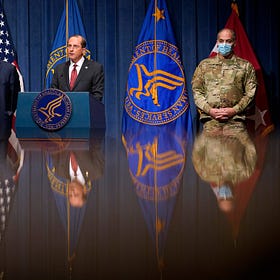Statecraft January Roundup
Regulations, Warp Speed, CHIPS, and the everything bagel
In the last month, we published four great interviews. One was on immigration rule making. Another was with former HHS Secretary Alex Azar, explaining why Operation Warp Speed worked so well.
How to Make Immigration Regulations
In his first years in office, President Biden undid many of the Trump Administration’s restrictions on immigration. But with aid to Israel and Ukraine now tied to immigration in Congress, Biden seems poised to move his immigration policy to the right.
How to Replicate Operation Warp Speed
Can policy makers take lessons from the success of Operation Warp Speed (OWS)? As my colleague Arielle D’Souza has noted, “the OWS model isn’t a universal solution to pressing problems.” But can we leverage specific features of it to prevent future pandemics, or cure Alzheimer’s, or other national priorities?
“On therapeutics, just from the history of dealing with monoclonal antibodies, we had reason to believe that we could create artificial human response through monoclonal antibodies. It became about brute force. Could you simply make things happen faster, execute faster than ever before?”
“For countermeasures, you have to say, “Is there a commercial marketplace?” I think we've seen with some of the recent announcements out of Pfizer that some of the antiviral markets maybe aren't as enduring and durable as we thought, but what's the commercial case that the US government needs to be involved as a guaranteed purchaser or funder of R&D to make that happen? Would it happen in the absence of government action? That for me is the first question. Because if it's going to happen without the US government doing it, we will only get in the way of it.”
Our most recent two interviews were about the CHIPS and Science Act, the major 2022 legislation that dedicated hundreds of billions of dollars to spurring semiconductor fabrication in the US. Specifically, we pushed Senate Majority Leader Chuck Schumer’s policy director to walk us through how the bill became law, and then we followed up with the man Biden tapped to guide the law’s implementation.
We enjoyed pairing these interviews, and we plan on doing series-style installments more often. Focusing on the same topic from different angles improved our questions and made us better able to draw good answers out of our interviewees. Keep an eye out for more paired interviews going forward.
How to Pass the CHIPS and Science Act
In 2022, the U.S. passed the Creating Helpful Incentives to Produce Semiconductors (CHIPS) and Science Act, which authorized $280 billion of investment in a broad range of targets, including quantum computing, clean energy initiatives, NASA, semiconductor manufact…
“There are teams of people dedicated to getting information out to senators. We process tons of complex parliamentary information every day. It often doesn't sound like English. So the whip’s office and floor staff will translate that through emails and other forms of communication. There's a broad apparatus dedicated to just doing that.”
“Let's say there are 100 unresolved issues at the start of a negotiation. The staffs will try to negotiate as many of those issues as possible, but inevitably there will be two, three, or ten that they need to, as folks would sometimes joke, kick up to people with election certificates.”
How to Allocate $52 Billion in CHIPS Funding
Last week, we spoke to Gerry Petrella, Chuck Schumer’s policy director, about how the CHIPS and Science Act finally became law. But we were left with questions. Once CHIPS was signed, what happened next? How does the money get allocated to the semiconductor industry? Who manages that process? How are recipients chosen? Are these investments reasonable?
“Supply chain management is studied in business school because it often focuses on businesses, rather than in a public policy school where it might focus on a national government. I think that’s a big difference. A harder question is, ‘What are the best ways for a country to secure the supply of a particular input now?’ To my knowledge, that hasn't been the central question in supply chain management.”
“You don't want to get into a situation where you're competing with what's called the winner's curse. If companies are shopping for where to locate, they’re going to try to get the best deal they can. If governments are competing against one another, you often end up in a situation where you're bidding against other government units... In the context of the CHIPS Act and these large grants, you have to make sure that you're not bidding against other countries, because we're going to pay more than we need to get these factories located in the U.S., and that will mean that we can finance fewer projects with a given budget.”
What We’re Reading
Biden official Ronnie Chatterji referenced an Ezra Klein op-ed, “The Problem With Everything-Bagel Liberalism,” in his interview with us. In that op-ed, Klein suggested that trying to pack too many liberal priorities into bills like CHIPS and Science risked making them less effective at achieving their main goals:
“It is very hard to read the guidelines the administration just released [on CHIPS subsidies] and see a serious effort to lower costs. The government is adding subsidies with one hand and layering on requirements with the other.”
Chatterji pushed back on this argument, pointing to the large number of companies competing for a limited number of grants as evidence that requirements will not seriously harm industry. But he acknowledged it will take time for the dust to clear and for economists to evaluate the success of CHIPS.
Recent news items have suggested there may be trouble ahead:
Both of TSMC’s chip fabs in Arizona have had their schedules pushed back due to lack of high-skilled talent and high costs.
Lengthy environmental review process are stalling other chip plants.
At IFP, we’ve highlighted how the same environmental review projects roadblock priorities like clean energy infrastructure.
From the right, observers like the Manhattan Institute’s Reihan Salam have argued that everything-bagel liberalism “reflects the priorities and nonnegotiable demands” of key segments of the Democratic coalition. Klein responded to Salam and other critics here. This debate has been running for the better part of a year; expect it to continue as major CHIPS funding flows out the door this election year.
For a printable transcript of this piece, click here:






